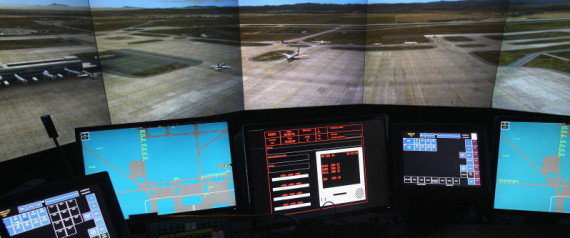hours
ago
By NBC's Luke Russert
Due to disagreements between the House and Senate, key programs inside the Federal Aviation Administration are slated to shut down by the end of Friday.
Aides from both sides tell NBC News that air-traffic controllers and safety inspectors will not be subject to the shutdown, and planes will fly and safety procedures will carry on -- because controllers and safety inspectors are considered essential employees.
Since September 2007, Congress has been unable to agree on a long-term FAA funding bill. Therefore, they have done a series of short-term extensions -- 20 in total. Right now, the House and Senate can't agree on the 21st short-term extension.
There are two particular disagreements. One is over labor rights. In February, the Senate passed an FAA extension bill that allowed for airline and railroad workers to unionize more easily. Under that legislation, a union could be set up if a simple majority of voters who were present approved of the union. Under the old rule, employees who didn't show up to the meeting were counted as "NO" votes on unionizing.
In April, the House passed a FAA extension bill that did away with this union provision. But Senate Democrats have said they won't pass a FAA extension bill that doesn't have the union provision.
A second disagreement is over rural airports. House Transportation Chairman Rep. John Mica (R-FL) wrote up another temporary FAA authorization bill that passed the House today, 243-117. But this extension wasn't clean: It included specific language that would strip funding away from some rural airports, including:
-- in Ely, Nevada (home state to Senate Majority Leader Harry Reid)
-- in Morgantown, West Virginia (home to Sen. Jay Rockefeller)
-- in Glendive, Montana (home to Senate Finance Chairman Max Baucus).
A GOP aide tells NBC News that the cuts would save about $16 million dollars.
Not surprisingly, Rockefeller, Reid, and Baucus saw Mica's move as trying to score personal political points and have said they will not agree to a bill that sacrifices small community airports.
What happens if the FAA shuts down?
The Transportation Department says:
-- 4,000 of the FAA's 32,000 workers will be furloughed on Saturday and that that number could rise.
-- airlines would no longer collect ticket taxes, which are used for a trust fund to pay some FAA employees.
-- some new construction projects at airports around the country will have to be put on hold
Where do we go from here?
It's unclear. A GOP aide says that a deal very well could be struck in the 11th hour. Dems are holding firm on the union provision as part of a long-term FAA funding bill and in the present time do not want to see community airports cut.
The GOP feels they have the high ground on the issue because they think Dem senators will look petty if they shutdown the FAA over three small airports in a short-term funding bill.
FAA Shutdown At Stake In House, Senate Clash Over Union Organizing

WASHINGTON — A quarrel between the House and Senate over union organizing by airline and railroad workers could lead to a shutdown of the Federal Aviation Administration.
The FAA's operating authority expires on Friday. The agency has operated under a series of 20 short-term extensions since Sept. 30, 2007, because lawmakers have been unable to agree on a long-term funding bill.
The FAA's 15,500 air traffic controllers are essential employees and would continue to work even if the agency's operating authority were to expire, Republican lawmakers told the House Rules Committee on Tuesday.
FAA spokeswoman Laura Brown declined to comment on the agency's plans in case its operating authority expires.
However, former FAA Administrator Marion Blakey said it's likely that other workers would face furloughs. The agency employs about 32,000 workers in addition to controllers. The extent of the furloughs would depend in part on how much cash is available in the federal trust fund for aviation programs and how long the shutdown goes on, she said.
In the event of a shutdown, airlines would no longer have to collect ticket taxes, which average about $60 per round-trip ticket, aviation industry officials said.
The root of the dispute is a labor provision in a long-term FAA funding bill passed by the House in April. The Republican-sponsored provision would make it more difficult for airline and railroad workers to unionize by overturning a National Mediation Board rule approved last year. It allows employees in those industries to form a union by a simple majority of those voting. Under the old rule, workers who didn't vote were treated as "no" votes.
Senate Democrats, who passed their own long-term FAA funding bill in February without the labor provision, have insisted that the labor issue be removed from any final bill.
With negotiations at a stalemate, the chairman of the House Transportation and Infrastructure Committee, Rep. John Mica, R-Fla., introduced a bill last week to extend the FAA's operating authority for the 21st time. Previous extensions had been routine, but this time Mica added a provision eliminating federal subsidies for airline service to 13 rural airports
No comments:
Post a Comment